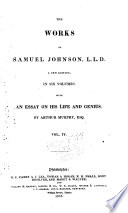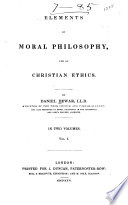 | Henry Rowe Schoolcraft - 1825 - 486 pages
...no trace remains. " To abstract the mind from all local emotion," says an eminent British tourist, " would be impossible, if it were endeavoured, and would...future predominate over the present, advances us in the dignity of thinking beings. Far from me and from my friends be such frigid philosophy as may conduct... | |
 | Samuel Johnson - 1825 - 510 pages
...savage clans and roving barbarians derived the benefits of knowledge, and the blessings of religion. To abstract the mind from all local emotion would...withdraws us from the power of our senses ; whatever inakea the past the distant or the future predominate over the present, advances us in the dignity... | |
 | Jean Rodolphe Peyran - 1826 - 620 pages
...and roving barbarians derived the benefits of knowledge and the blessings of religion," observes, " To abstract the mind from all local emotion would...future predominate over the present, advances us in the dignity of thinking beings. Far from me and from my friends be such frigid philosophy, as may conduct... | |
 | John Minter Morgan - 1826 - 294 pages
...benefits of knowledge, and the blessings of religion. To abstract the mind from all local emotions would be impossible, if it were endeavoured, and would...future, predominate over the present, advances us in the dignity of thinking beings. Far from me, and from my friends, be such frigid philosophy as may conduct... | |
 | James Boswell - 1826 - 416 pages
...benefits of knowledge and the blessings of religion. To abstract the mind from all local emotion would he impossible, if it were endeavoured; and would be foolish,...future, predominate over the present, advances us in the dignity of thinking beings, tzi from me, and from my friends, be such frigid philosophy as may conduct... | |
 | Daniel Dewar - 1826 - 558 pages
...the savage of the wood, or in the vassal of the tyrant, hopeless. " Whatever," says Dr. Johnson, " withdraws us from the power of our senses ; whatever...future, predominate over the present, advances us in the dignity of thinking beings." Viewed in this light, the quibbles of the schoolmen, and the trifling... | |
 | Daniel Dewar - 1826 - 528 pages
...the savage of the wood, or in the vassal of the tyrant, hopeless. " Whatever," says Dr. Johnson, " withdraws us from the power of our senses ; whatever...future, predominate over the present, advances us in the dignity of thinking beings." Viewed in this light, the quibbles of the schoolmen, and the trifling... | |
 | Kenelm Henry Digby - 1826 - 330 pages
...the benefits of knowledge and the blessings of religion. To abstract the mind from all local emotions would be impossible if it were endeavoured, and would...were possible. Whatever withdraws us from the power r Hist. lit. de 1'Italie ii. p. 373 and 453. of our senses, whatever makes the pas't, the distant,... | |
 | 1826 - 738 pages
...of the coldhearted politician, the mockery of the man of wit, and the pity of the man of pleasure. " To abstract the mind from all local emotion would...impossible, If it were endeavoured ; and would be foolisb, if it were possible* Whatever withdraws us from the power of our senses ; whatever makes the... | |
 | 1828 - 546 pages
...savage clans, and roving barbarians, derived the benefit of knowledge and the blessings of religion. To abstract the mind from all local emotion would...future predominate over the present, advances us in the dignity of thinking beings. Far from me, and from my friends, be such frigid philosophy, as may conduct... | |
| |